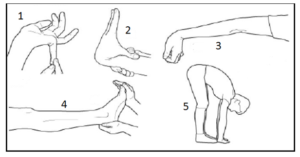
Do You Have a Hypermobility Disorder?
At Aspen Integrative Medical Center, Dr. Alexandra Mele specializes in the evaluation and management of hypermobility spectrum disorders such as Ehlers-Danlos Syndrome (EDS). Individuals with these conditions often go undiagnosed not knowing it is causing their chronic gastrointestinal issues, fatigue, joint instability/pain, fainting/dizziness, delayed wound healing, and much more. For those individuals who have been diagnosed with a hypermobility spectrum disorder find the conventional medical field has little to no guidance on treatment. This needs to change! So let’s go over the common symptoms and how to screen yourself at-home, so you can get the necessary care for your condition.
Common symptoms indicating you should be evaluated for a hypermobility spectrum disorder:
- Joint pain: Frequent joint pain, stiffness, and muscle aches are common symptoms.
- Joint instability: Joints may feel unstable or “give way” easily, leading to recurrent injuries or dislocations.
- Soft tissue injuries: Increased joint flexibility can put stress on the supporting ligaments, tendons, and muscles, leading to sprains, strains, and other soft tissue injuries.
- Chronic fatigue: Many people experience persistent fatigue and low energy levels.
- Joint clicking or popping: Joints may make audible sounds during movement due to lax ligaments.
- Skin and tissue involvement: Some forms of hypermobility spectrum disorders can affect the skin, leading to features such as stretchy or fragile skin, easy bruising, and delayed wound healing.
- Gastrointestinal issues: Some individuals may experience digestive problems, such as irritable bowel syndrome (IBS) and small intestinal bacterial overgrowth (SIBO).
- Dysautonomia (aka autonomic dysfunction): In certain cases, hypermobility spectrum disorders can involve dysfunction of the autonomic nervous system, leading to symptoms like dizziness, fainting, and postural orthostatic tachycardia syndrome (POTS).
Common signs of indicating you should be evaluated for a hypermobility spectrum disorder:
- You can bend your pinky finger up at 90° to the back of your hand
- Your can bend your thumb back more than 90° towards your forearm
- Your elbow bend backwards
- Your knees bend backwards
- You can put your hands flat on the floor with your knees straight

If you have any of the above symptoms or signs, please give us a call to schedule a visit with Dr. Alexandra Mele, so she can do a thorough work-up, determine if you indeed have a hypermobility spectrum disorder, and advise on the proper treatment options for your condition.




